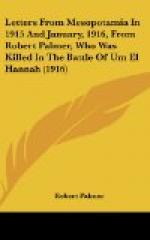About 4.30 the mirage cleared and our guns had a free go for the first time that day: (in the morning mists last until the mirage begins). I’m told the mirage had put our guns over 1,000 yards out in their ranging, but I doubt this. Anyway it is the fact that those guns and trenches which were sited in mirages were practically untouched in a heavy two days’ bombardment.
In that last hour, however, between 4.20 and dark, our heavy guns got into the enemy finely with their high explosives. They blew one of our tormentors bodily into the air at 10,500 yards, and silenced the others, and chased every Turk out of the landscape.
All the same, we were rather gloomy that night. Our line had made no progress that we could hear of; we had had heavy losses (none in our battalion), and there seemed no prospect of dislodging the enemy. Their front was so wide we could not get round them, and frontal attacks on trenches are desperate affairs here if your artillery is paralysed by mirages. The troops who have come from France say that in this respect this action has been more trying than either Neuve Chappelle or Ypres, because, as they say, it is like advancing over a billiard-table all the way.
To crown our troubles, we were three miles from the river, which meant no water except for necessities—the men had no kits, and it was very cold, and we could not show lights. And finally, after midnight, it began to pour with rain!
Sunday. At 5.30 we stood to arms. It rained harder than ever and most of us hadn’t a dry stitch. At last it got light, the rain gradually stopped, and a thoroughly depressed battalion breakfasted in a grey mist, expecting to be bombarded the moment it lifted. About 8.30 the mist cleared a little, and we looked in vain for our tormentors. Our cavalry reconnoitred and, to our joy, we saw them ride clean over the place where the enemy’s line had been the evening before. They had gone in the night.
A cold but drying wind sprang up and the sun came out for a short time, and we managed to get our things dry. At 1 o’clock we marched back to the river and found the bridge gone.
I think this makes a good place to stop, as it marks the end of our first series of adventures and of the no doubt by now famous battle of D.
I enclose a sketch-map to explain our movements. For obvious reasons I can’t say much about the battle itself.
(I will briefly bring this up to date, post it and try to get a cable through to you.)




